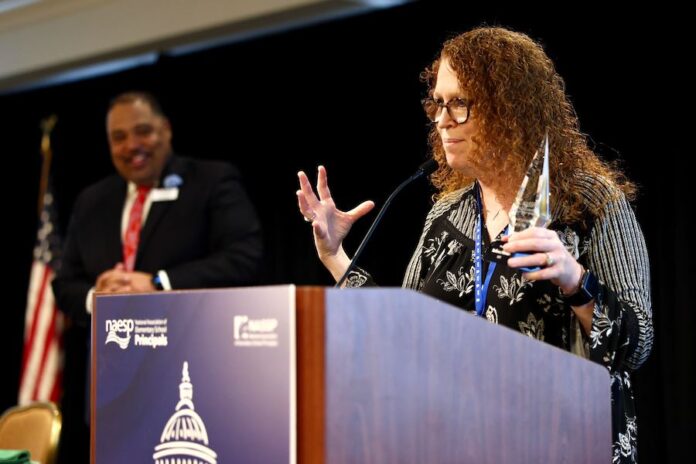Political advocacy is the best way that Principal Melissa Shindel knows for K12 leaders to take control of the narratives around our education system. That’s why the leader of Glenwood Middle School in Maryland’s Howard County Public Schools makes it a priority to stay involved in shaping policy and perspectives at the local, state and federal levels.
“Advocacy is telling stories so people who aren’t in our buildings can understand what it’s like day to day,” says Shindel, the Maryland state coordinator for the National Association of Secondary School Principals, the influential professional association. “There’s a narrative out there and either we tell it or someone else does. If we don’t speak up, things are going to happen to our schools without our input.”
As a principal at four different schools over the past 14 years, Shindel has worked with community organizations to open a school-based food pantry and create scholarships so underprivileged students have the same opportunity to go on field trips as do their more affluent classmates. At one school, she and her team got a new hallway built to ease overcrowding.
And just as she is not bashful about bringing concerns to central office, she also encourages her middle school staff to make her aware of their own concerns. “Sometimes, it’s just having the courage to bring things to someone’s attention,” Shindel explains. “When teachers bring something to my attention, I thank them.”
She also regularly invites local leaders, such as the Howard County executive, and national leaders—such as Maryland’s U.S. senators and U.S. Department of Education officials—to tour her school. She also participates in local leadership programs by allowing people to shadow her during the workday.
‘Communicating and building relationships’
In 2021, the “Blueprint for Maryland’s Future” was launched to guide the state’s schools in adopting best practices for improving student achievement, school climate and other key aspects of the K12 system. Shindel is a big supporter of the initiative but objected to a proposal to require assistant principals to teach in classrooms a certain number of hours each week. “In theory, it’s an amazing idea, in reality, it’s not realistic,” she points out, adding that the Blueprint’s developers did not consult building leaders on this idea.
Even outside the classrooms, administrators do plenty of teaching, both academic and social-emotional, from coaching and observing teachers to connecting with students around the building.
At the federal level, she has teamed up with colleagues from the National Association of Elementary School Principals to lobby lawmakers on Capitol Hill. She and other principals try to meet annually with members of Congress or their staff to alert them to the needs of students and schools. “They ask questions, and we’re communicating and building relationships,” Shindel says.
A primer on political advocacy
If you have always been reluctant as a K12 leader to become more active politically, you’re not alone. “It can feel risky to choose sides in a messy
partisan battle when the goal up to that point has been to stay above the fray,” writes Marc Porter Magee, CEO of the education nonprofit, 50CAN, in his new FutureEd report, “Electoral Advocacy: Social Change Through Political Strategy.” “The first step is to let go of simplistic stories about how elections work. The truth is that building political clout through electoral advocacy is difficult, incremental and unpredictable.”
Magee tackles a few questions educators and advocates may have about political advocacy. For instance, can you actually persuade the public to vote for your cause? Research shows the answer is yes: “The most effective tool for getting voters to change their preexisting beliefs is storytelling,” Magee asserts.
It’s also OK for education advocates to recruit candidates, as long as they do so well in advance of the campaign to allow those candidates can build confidence and get up to speed on the issues. “Electoral work can matter but often fails to have an effect because advocates don’t engage in elections productively,” Magee concludes. “The more personal the tactics, the better.”
More from DA: Student success—What have we learned about what does and doesn’t work?










